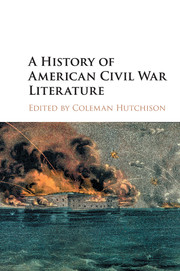Book contents
- Frontmatter
- Dedication
- Contents
- List of Illustrations
- Notes on Contributors
- Preface
- Acknowledgments
- Part I Contexts
- Part II Genres
- 6 Dépôt Culture: The Civil War and Periodical Fiction
- 7 Imitation and Resistance in Civil War Poetry and Song
- 8 Children's Literature
- 9 Writing Lives: Civil War Diaries
- 10 Civil War Memoir
- 11 Civil War Narrative History
- Part III Figures
- Recommendations for Further Reading
- Index
10 - Civil War Memoir
from Part II - Genres
Published online by Cambridge University Press: 05 December 2015
- Frontmatter
- Dedication
- Contents
- List of Illustrations
- Notes on Contributors
- Preface
- Acknowledgments
- Part I Contexts
- Part II Genres
- 6 Dépôt Culture: The Civil War and Periodical Fiction
- 7 Imitation and Resistance in Civil War Poetry and Song
- 8 Children's Literature
- 9 Writing Lives: Civil War Diaries
- 10 Civil War Memoir
- 11 Civil War Narrative History
- Part III Figures
- Recommendations for Further Reading
- Index
Summary
Mary A. H. Gay opened her Civil War memoir, Life in Dixie During the War, with a declaration and a call to arms. “I have long felt that it was the duty of the South to bequeath to posterity” a record of the antebellum and Confederate past, she wrote, “for if we do it not ourselves they will be swallowed up in oblivion.” “Entering this opinion,” she continued, “I have essayed the task of an individual effort, and hope that others will follow my example.” Her remarks acknowledge the democratic appeal of memoir. Perhaps more than any other genre, memoir offered combatants and noncombatants, common foot soldiers and generals, and pawns and power brokers, the opportunity to shape postwar memory of the nation's most cataclysmic event. A memoirist did not require formal training, Gay implied. Nor was access to the postwar reading audience reserved only for those who played particular roles in the conflict. For Gay and countless others, a memoirist need only to have lived through the bloody conflict to have something important to say. The proliferation of Civil War memoirs that appeared on the literary market in the late nineteenth and early twentieth centuries suggests that publishing firms and readers agreed.
Gay's comments point to more than the universal appeal of memoir, however. By 1892, when Gay published Life in Dixie During the War, the battle to direct the ways the war was remembered had intensified. Civil War memory influenced not only cultural production in the first five decades following Confederate defeat but also social and public policy. Put another way, the culturally sanctioned memory of the past helped chart the future direction of the nation.
And every voice was needed. To underscore that point, Gay enlisted the help of her fellow former Confederates to lift their pens for the cause. General William T. Sherman also called on his friends (and enemies) to offer their impressions, although his appeal was more belligerent than that of Gay. “In this free country,” he blustered in the preface to the second edition of his memoirs, “every man is at perfect liberty to publish his own thoughts and impressions, and any witness who may differ from me should publish his own version of facts in the truthful narration of which he his interested.”
- Type
- Chapter
- Information
- A History of American Civil War Literature , pp. 151 - 164Publisher: Cambridge University PressPrint publication year: 2015



